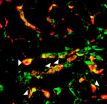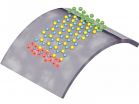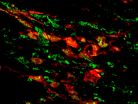Because natural gas emits half the carbon dioxide of coal, many people hoped the recent natural gas boom could help slow climate change—and according to government analyses, natural gas did contribute partially to a decline in U.S. carbon dioxide emissions between 2007 and 2012. But, in the long run, according to this study, a global abundance of inexpensive natural gas would compete with all energy sources – not just higher-emitting coal, but also lower-emitting nuclear and renewable energy technologies such as wind and solar. Inexpensive natural gas would also accelerate economic growth and expand overall energy use.
"The effect is that abundant natural gas alone will do little to slow climate change," said lead author Haewon McJeon, an economist at the Department of Energy's Pacific Northwest National Laboratory. "Global deployment of advanced natural gas production technology could double or triple the global natural gas production by 2050, but greenhouse gas emissions will continue to grow in the absence of climate policies that promote lower carbon energy sources."
Thinking Globally
Recent advances in gas production technology based on horizontal drilling and hydraulic fracturing – also known as fracking – have led to bountiful, low-cost natural gas. Because gas emits far less carbon dioxide than coal, some researchers have linked the natural gas boom to recent reductions in greenhouse gas emissions in the United States. But could these advanced technologies also have an impact on emissions beyond North America and decades into the future?
To find out, a group of scientists, engineers and policy experts, led by PNNL's Joint Global Change Research Institute, gathered at a workshop in Cambridge, Maryland, in April 2013 to consider the long-term impact of an expansion of the current natural gas boom on the rest of the world. The researchers, hailing from the U.S., Australia, Austria, Germany and Italy, went home and projected what the world would be like in 2050 with and without a global natural gas boom. The five teams used different computer models that had been independently developed.
Their computer models included not just energy use and production, but also the broader economy and the climate system. These "integrated assessment models" accounted for energy use, the economy, and climate and the way these different systems interact with one another. The groups each computed projections halfway into the century.
Five for Five
"We didn't really know how our first experiment would turn out, but we were surprised how little difference abundant gas made to total greenhouse gas emissions even though it was dramatically changing the global energy system," said James "Jae" Edmonds, PNNL's chief scientist at JGCRI. "When we saw all five modeling teams reporting little difference in climate change, we knew we were onto something."
The key, the researchers said, is that the five different models provide an integrated, comprehensive view of the economy and the Earth system. Swapping out coal for natural gas in a simple model would cut greenhouse gas emissions, a result many people expected to see. But incorporating the behavior of the entire economy and how people create and use energy from all sources affect emissions in several ways:
Natural gas replacing coal would reduce carbon emissions. But due to its lower cost, natural gas would also replace some low-carbon energy, such as renewable or nuclear energy. Overall changes result in a smaller reduction than expected due to natural gas replacing these other, low-carbon sources. In a sense, natural gas would become a larger slice of the energy pie.
Abundant, less expensive natural gas would lower energy prices across the board, leading people to use more energy overall. In addition, inexpensive energy stimulates the economy, which also increases overall energy use. Consequently, the entire energy pie gets bigger.
The main component of natural gas, methane, is a more potent greenhouse gas than carbon dioxide. During production and distribution, some methane inevitably escapes into the atmosphere. The researchers considered both high and low estimates for this so-called fugitive methane. Even at the lower end, fugitive methane adds to climate change.
The combined effect of the three, the scientists found, is that the global energy system could experience unprecedented changes in the growth of natural gas production and significant changes to the types of energy used, but without much reduction to projected climate change if new mitigation policies are not put in place to support the deployment of renewable energy technologies.
"Abundant gas may have a lot of benefits—economic growth, local air pollution, energy security, and so on. There's been some hope that slowing climate change could also be one of its benefits, but that turns out not to be the case," said McJeon.
INFORMATION:
Scientists, engineers and economists from the following institutions contributed to the research: the JGCRI, a collaboration between PNNL and the University of Maryland, BAEconomics, the International Institute for Applied Systems Analysis, the Potsdam Institute for Climate Impact Research, the Centro Euromediterraneo sui Cambiamenti Climatici, and Resources for the Future.
PNNL researchers on this project were supported by the Global Technology Strategy Project, a public-private partnership.
Reference: Haewon McJeon, Jae Edmonds, Nico Bauer, Leon Clarke, Brian Fisher, Brian P. Flannery, Jérôme Hilaire, Volker Krey, Giacomo Marangoni, Raymond Mi, Keywan Riahi, Holger Rogner, Massimo Tavoni. Limited impact on decadal-scale climate change from increased use of natural gas, Nature September 15, 2014, doi: 10.1038/nature13837.
Interdisciplinary teams at Pacific Northwest National Laboratory address many of America's most pressing issues in energy, the environment and national security through advances in basic and applied science. Founded in 1965, PNNL employs 4,300 staff and has an annual budget of about $950 million. It is managed by Battelle for the U.S. Department of Energy's Office of Science. As the single largest supporter of basic research in the physical sciences in the United States, the Office of Science is working to address some of the most pressing challenges of our time. For more information on PNNL, visit the PNNL News Center, or follow PNNL on Facebook, Google+, LinkedIn and Twitter.




